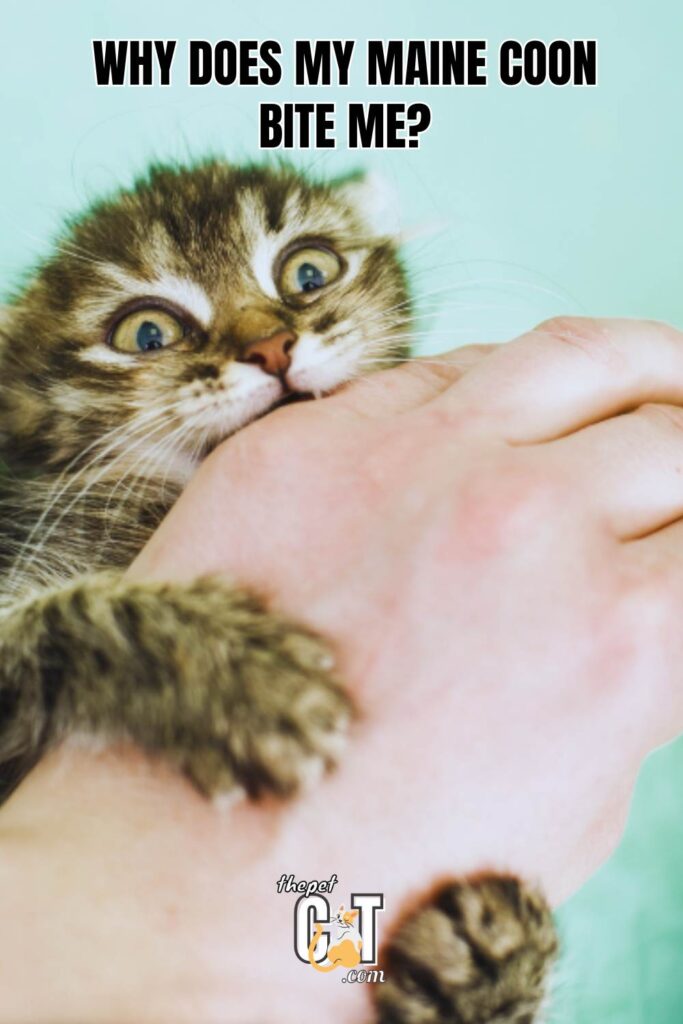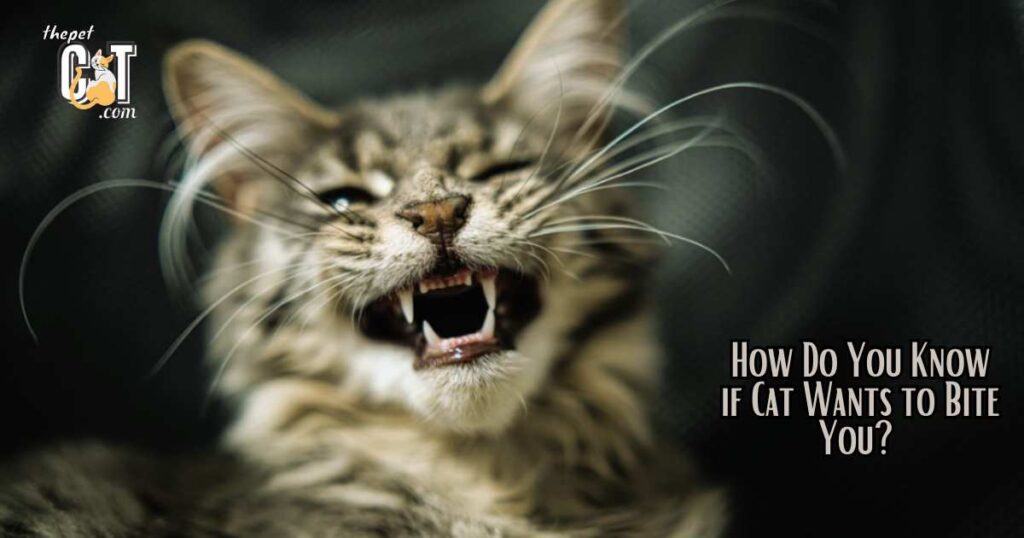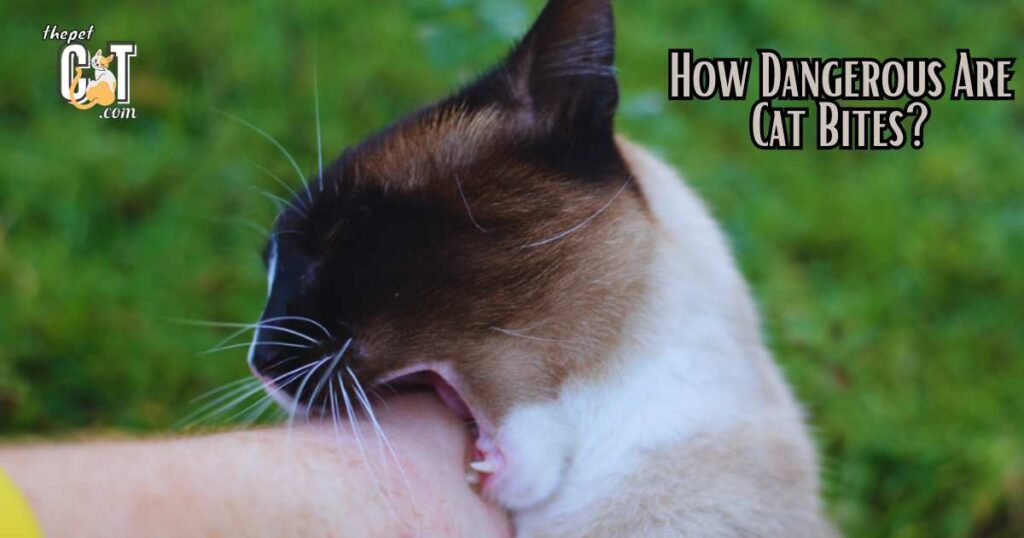Maine coon can bite their owner due to genetics, Hunger, Feeling scared, provocation, etc. If you check these signs like flicking its tail, visible Claws, raising a paw, and Flattening its ears, it means your coon can bite you.
You can prevent your Maine coon bite by using toys, redirecting it, giving it space and time to calm down, playing with it, checking its comfort, etc. Though house cat bite force is minimum (70 PSI), it can still cause you to have a serious infection.
However, this article will offer you all the possible reasons and ideas of Why does my Maine coon cat bite me? Moreover, a brief preventative, signs of serious infection, and a first aid idea for cat biting. Let’s uncover them below.
Why Does My Maine Coon Bite Me?

Cats caused 8% of all the animal bites reported. The annual average for feline aggression events was 6.36 per 100,000 persons. These incidents mostly happen in summer, especially with women and children.
But Maine coon cats behavior is usually gentle and friendly. Many owners agree with it. But they may sometimes bite you. This can happen for different reasons. Let’s learn why Maine coon bites their owner.
1. Genetics
One of the prime reasons is genetics. Like humans, cats can inherit traits from their parents, such as being friendly or aggressive. Research shows that a cat’s parents can greatly influence its behavior.
For example, about 70% of kittens with friendly parents tend to be friendly themselves. Even if they’re separated from their parents early on, they remain the same. This suggests that genes significantly influence cat behavior.
2. Handling Young Kittens
Handling kittens early on is really important. Starting when they’re about 2 weeks old, it’s best to get them used to being held and petted.
This helps them feel comfortable around people. Without this, kittens might become scared or aggressive when approached or touched. And they may bite their owner.
Lack of handling and socialization can lead to antisocial and attacking adult cats.
3. Kitten Play
Kittens, including Maine Coons, express playful behaviors like gentle biting and scratching as they explore their environment. This may naturally be the case.
However, about 50% of kittens might not learn appropriate bite inhibition without proper socialization during play. This leads to playful biting that can persist into adulthood.
4. Hunger
Hunger is a big reason why Maine Coon cats may bite or scratch. Just like us, they need regular meals. If they’re hungry or their feeding schedule is irregular, this can make Maine coon angry. Thus, they might resort to biting or scratching.
It is a means of communicating their need for food. As their hunger intensifies, they may become more irritable and prone to defensive behaviors.
5. Your Harsh Behavior
Your actions around your Maine Coon cat influence its behavior, including biting or scratching. Cats react to perceived threats, so rough play or inconsistent boundaries may trigger defensive responses.
Rough handling, loud noises, or sudden movements can make your cat feel scared or stressed. Thus, aggressive Maine coon can show protective responses, including biting or scratching.
6. Changes at Home
Changes in the home environment can lead to Maine Coon biting. When things like moving to a new house, rearranging furniture, or adding new pets or family members happen, your cat can feel stressed or anxious.
This stress may cause Maine coon cat attacks, such as by biting.
7. Old Age
In their senior years, Maine Coon cats may develop biting or scratching behaviors due to age-related changes. Factors such as diminished senses, like sight or hearing, can make them feel startled or defensive. And it leads to their biting behavior.
Approximately 80% of cats over the age of 10 experience some form of arthritis. This can cause discomfort and pain, potentially triggering defensive reactions if touched in sensitive areas.
8. Grumpy
Maine Coon cats, like people, have days when they feel grumpy and want space. On these days, they might bite or scratch to say, “Leave me alone.”
It’s their way of showing they’re not in the mood for interaction. Recognizing their feelings and giving them space can help avoid bites or scratches.
9. Feeling Scared
Maine Coon cats may bite or scratch if they feel too scared or threatened. Sudden noises, environmental changes, or feeling trapped can trigger defensive reactions.
Past negative experiences or physical discomfort could also play a part. Providing a safe environment and avoiding sudden movements can help reduce fear-related behaviors in Maine Coons.
10. Provocation
Maine Coon cats might bite or scratch if bothered, especially by kids who may not know limits. Continuously poking or grabbing at a cat can make it feel threatened.
This may lead to Maine coon behavior problems and defensive reactions. Cats prefer things their way, so forcing them into unwanted situations can result in Maine coon attacks and biting. It serves as a kind of self-defense or expression of discomfort. It’s essential to teach children to respect animals’ boundaries.
11. Feeling ill
When cats feel sick, they might get grumpy and react by scratching or biting. They could be experiencing pain or discomfort. This leads to a defensive response many times. It’s important to take them to the vet if they seem unwell to address any health issues.
12. Seeking Attention
When your Maine Coon cat wants your attention, they might resort to biting or scratching to get noticed. Cats can be quite expressive in their demands for attention.
Research suggests cats engage in attention-seeking behaviors, including biting or scratching, when they feel neglected. About 70% of cat owners report that their cats exhibit attention-seeking behavior.
13. Matted Fur
When Maine Coon cats get tangled in fur, it can be painful. These knots pull on their skin, causing discomfort. Just like pulling your hair, it’s not pleasant.
Touching these tangles can hurt your cat. Thus, your cat can be irritated and bite them.
14. Too Much Stroking
Petting/stroking your Maine Coon too much can bother them. Watch for signs like tail wagging, no purring, flat ears, or low growls, which mean they’ve had enough. Ignoring these signs might lead to a bite. This may be the way for your cat to get you to stop.
How Do You Know if Cat Wants to Bite You?

The signs below may indicate that your cat may bite you now. This may assist in saving yourself from biting.
- Stopping purring suddenly
- Tensing its body or freezing momentarily
- Flicking its tail
- Raising a paw
- Flattening its ears
- Emitting hissing or growling sounds
- Staring at your hand, feet, or arms
- Claws may become visible
- Whiskers moving forward
- Exhibiting aggressive body language
How to Stop My Cat From Biting and Attacking Me
To prevent your cat from biting or attacking you, it’s important to find out the underlying causes of their behavior and use effective solutions:
Offer Alternatives
Provide toys like feather teasers or plush toys for your cat to play with, redirecting their focus from biting you. These toys resemble prey and promote natural hunting habits.
By giving them something else to target, you can channel their energy away from your limbs and prevent playful aggression toward you.
Don’t Use Your Hand as a Toy
Instead of using your hand like a toy to play with a kitten, try using a string or feather toy. To teach your kitty to chase and pounce on a toy, move it around to simulate prey.
This way, you can have fun playing without accidentally getting bitten or scratched by the kitten, thinking your hand is a toy.
Exercise
You can encourage your Maine Coon to exercise with daily play sessions lasting 10-15 minutes. You can utilize suitable toys, such as feather wands or laser pointers.
You may need to aim for at least 2-3 sessions per day. Providing possibilities for climbing and exploration can also be beneficial. Research suggests that cats need around 30 minutes to 2 hours of playtime daily to stay mentally and physically stimulated.
Safe and Appropriate Environment
Creating a safe space for your Maine Coon can help lessen biting. When cats feel secure and comfortable, they’re less likely to act defensively. Giving them hiding spots and places to climb fulfills their natural needs and promotes a calmer demeanor. This lowers the risk of biting because of stress or worry.
Gentle Behavior
Being gentle when handling your cat helps to create a sense of trust and security. When your pet feels secure and at ease around you, they are less likely to engage in protective actions like biting.
By interacting calmly and respectfully, you foster a positive relationship with your Maine Coon. This may reduce the likelihood of aggressive responses. Research suggests that cats who feel secure in their environment are 70% less likely to exhibit aggressive behaviors.
Avoid Punishing or Hissing It
Avoiding punishment or hissing at your cat helps maintain a positive and trusting relationship. Punishment may promote anxiety and stress in cats, leading to aggressive actions such as biting and attacking. Instead, you need to focus on positive reinforcement techniques.
Offer Space and Time to Adjust
Allowing your Maine Coon time to adjust to its new environment can help reduce biting. During this period, the cat becomes more comfortable and builds trust. As a result, they’re less likely to resort to defensive behaviors like biting.
Read More: Can Maine Coon Cats Be Indoor Cats?
Using Room Diffusers or Feliway Spray
People have claimed using a room diffuser or Feliway spray can help relax cats, especially in a new setting. It can require a period of 4 weeks to be effective. So be patient.
Provide Consequences for Biting
Establishing consequences is important if your cat continues to bite despite previous attempts to stop the behavior. When they bite, remove them from the situation and give them a “time-out.”
This involves placing them in a quiet area of the home for a short period. You need to confirm they can access water, food, and a litter box.
Get Them a Furry Friend
Consider getting your cat a furry friend if they exhibit biting behavior. Cats can become bored or lonely when left alone for extended periods. Another pet, like a cat, can provide companionship.
If your cat tries to bite their new friend during play, the other animal may retaliate, teaching your cat that biting is unacceptable. While not always effective, this approach has succeeded for some.
Note: If your cat’s biting continues despite your efforts, seek guidance from a veterinarian to check for any medical issues and get advice on managing behavior.
Read More: Do Maine Coons Get Along With Dogs?
How to Discipline a Cat for Biting
Disciplining a cat for biting means teaching them not to do it. When your cat bites, say “no” firmly or make a sharp noise to get their attention. Then, give them something else to do, like playing with a toy.
Don’t hit or scare them. Instead, praise them when they play gently and give them treats. Being consistent and patient is important for training your cat not to bite.
How Dangerous Are Cat Bites?

Though the domestic cat bite force is comparably weak, it’s only for 70 PSI. These bites can pose significant health risks due to bacteria in a cat’s mouth, notably Pasteurella multocida.
These bacteria can induce infections in bite wounds. And result in redness, swelling, and pain. Prompt treatment is crucial to prevent complications.
- Cat bites introduce bacteria. This may lead to cellulitis and abscesses.
- Untreated cat bite infection can spread, which can cause systemic illness and sepsis.
- Cat bites can lead to additional infections like cellulitis or abscesses if left untreated.
- Bites may transmit Bartonella henselae, which causes cat scratch fever.
- Severe bites cause pain, swelling, and potential scarring.
- Cat bite wounds often heal slowly and may require medical intervention.
- Deep puncture wounds pose an increased risk of tetanus infection.
How Do You Know if a Cat Bite is Serious?
Many cat owners, including Maine coon may face their kitten biting. There may be different reasons for individuals and different times. However, a common question for many owners is, “Is my cat bite infected?’ Approximately 50-80% of cat bites require medical attention.
The below signs can let you know which cat bite is serious. This will help you make a decision.
- A fever indicates that your body may be facing an infection.
- The bite part can feel unpleasant, particularly when touched.
- The layer of skin or tissues near the bite may appear bigger, swollen, and red.
- And they may feel heated to the touch.
- Streaks or Red lumps near the bite may suggest a severe infection.
- Thick, colored fluid pouring from the spot (e.g., white, yellow). It is often smelly. This indicates a serious infection.
- If the wound has continuous bleeding, even after 15 min and becomes painful, it is serious.
The American Society for Surgery of the Hand identifies symptoms of a spreading infection as fever, swollen glands, exhaustion, tremors, and night sweats. If you notice such signs, kindly go to the doctor and check.
How To Treat A Cat Bite At Home?
For cat biting treatment at home, you can follow the below tips.
- Start by washing the wound with antiseptic soap and water.
- Apply pressure to stop bleeding, and then cover the area with a bandage.
- Keeping the wound elevated can help prevent swelling.
- However, if the bleeding won’t stop, the bite is deep, or there are signs of infection, it’s essential to seek medical attention promptly.
Note: You need to observe the bite wound for 10 days. If you get something fishy, consult with the doctor. The above treatment is just like first aid treatment.
FAQs
Are Maine Coon Cats Dangerous?
No, Maine Coon cats are not generally considered dangerous. They are recognized for their kind and caring nature. Such personality makes them suitable pets for families, especially when properly socialized.
How Long After a Cat Bite Does Infection Set in?
You may notice some common signs (pain, swelling, etc) within 24 to 48 hours. However, some serious symptoms occur within 3 to 5 days. It may take 1 to 14 days, depending on factors like how bad the bite was and your body’s ability.
Can a Cat Bite Break a Bone?
Yes, a cat bite can break a bone, although it’s relatively rare. Cat bites can be forceful enough to cause fractures, especially if the bite occurs near a fragile bone or joint. Immediate medical attention is necessary if it happens.
Final Verdict
Why does my Maine coon bite me? It can happen due to genetics, boredom, sickness, fear, provocation, etc.
However, to prevent your Maine coon biting, you can train it, redirect it using toys and other methods mentioned above. And if it bites you and you notice some serious signs like redness, swelling, or pus drainage. You need to get medical attention.
You May Also Like to Read:

